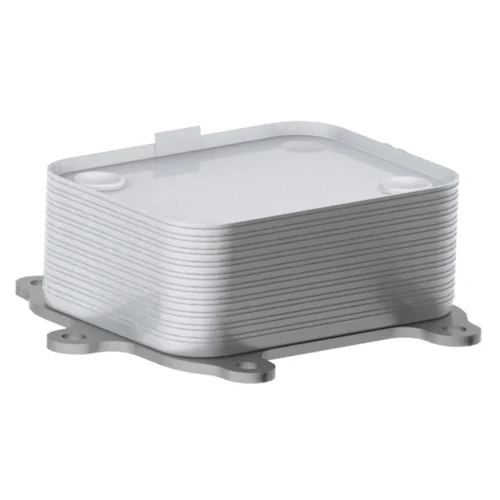Introduction
Stainless steel oil cooler is a type of heat exchanger that uses stainless steel as the primary construction material to transfer heat from oil (such as engine, hydraulic, or gearbox oil) to another cooling medium like water, air, or coolant. Stainless steel is preferred over conventional materials like copper or aluminum in environments where corrosion, high pressure, extreme temperatures, or sanitary requirements are present. These coolers are engineered to perform reliably in hostile environments and continuous operation settings, making them ideal for use in marine vessels, chemical plants, hydraulic power units, and food-grade machinery.
By reducing oil temperature effectively, these coolers help in maintaining the viscosity, lubrication properties, and thermal stability of the oil, ultimately extending the life of machinery and minimizing system failures.
Construction Features
- Material: Stainless Steel (SS304, SS316, SS316L)
- These alloys offer high tensile strength, excellent corrosion resistance, and temperature durability.
- SS316L, in particular, is used in food-grade and pharmaceutical applications due to its low carbon content and resistance to chemical attack.
- Core Design: Plate-Type, Tube-Type, Fin-Type
- Tube-type designs are common in heavy-duty applications (e.g., marine and industrial systems) where high pressure is involved.
- Plate-type coolers offer a larger surface area for heat transfer in a compact form, ideal for limited-space installations.
- Fin-type (air-cooled) increases surface exposure to ambient air, enhancing natural or forced convection cooling.
- Inlet/Outlet Ports
- Precision-machined ports for oil and coolant, available in various thread or flange types (e.g., NPT, BSP, SAE).
- Designed for leak-proof, secure connections and optimized flow.
- Mounting Brackets
- Heavy-duty or compact brackets depending on the size and location of installation.
- Allow vertical or horizontal mounting in engines, skid systems, or plant layouts.
- Pressure Rating
- Stainless steel coolers can typically handle working pressures of 15–40 bar, with some heavy-duty variants designed for even higher pressures.
- Suitable for high-load systems such as industrial presses, injection molding machines, and marine propulsion systems.
- Multi-Pass Flow Arrangement
- Coolers can be designed in 2-pass, 4-pass, or even 6-pass configurations to enhance thermal contact time.
- Increases the effectiveness of cooling for applications with high thermal loads.
Advantages
- Corrosion Resistance
- Stainless steel withstands saline water, acidic chemicals, and humidity without rusting or pitting.
- Ideal for marine, offshore, chemical processing, and open-environment applications.
- High Durability
- Withstands mechanical stress, vibration, and high flow rates without deformation.
- Ideal for continuous-use machinery in heavy industries where equipment must operate without failure.
- Thermal Efficiency
- Stainless steel has good thermal conductivity and maintains structural integrity under high temperatures.
- Ensures consistent oil cooling, which reduces component wear and improves energy efficiency.
- Hygienic and Food-Grade Safety
- In industries like food processing, dairy, and pharmaceuticals, cleanliness is non-negotiable.
- SS316L meets hygienic standards and can withstand CIP (clean-in-place) cleaning procedures.
- Low Maintenance
- Easy to clean both internally and externally.
- Non-porous surface prevents scaling and contamination.
- Longer service life compared to aluminum and copper, reducing maintenance intervals and operating costs.
- Eco-Friendly
- Fully recyclable and does not release harmful ions into process fluids.
- Complies with RoHS and other environmental regulations.
- Customizable
- Can be custom-designed to fit your system’s flow rate, pressure, installation space, and thermal duty.
- Available in modular configurations for easy scalability.
Applications
- Marine Engines
- Used to cool engine oil, transmission fluid, and turbo systems in boats, ships, and offshore rigs.
- Stainless steel handles seawater exposure without corroding.
- Hydraulic Systems
- Essential for regulating hydraulic oil temperatures in excavators, presses, cranes, and industrial robots.
- Prevents overheating and viscosity breakdown.
- Automotive & Racing Engines
- Keeps engine or transmission oil at safe temperatures during high-performance runs.
- Used in motorsports, trucks, buses, and military vehicles.
- Chemical Processing
- Withstands corrosive chemicals, acids, and solvents in oil cooling circuits.
- Common in reactors, mixing vessels, and chemical transfer systems.
- Food & Beverage
- Maintains safe temperatures in edible oil systems, fryers, and processing equipment.
- Complies with FDA and HACCP standards for hygiene.
- Power Plants
- Cools turbine lube oil, generator bearing oil, and transformer oil to prevent breakdown during high-load operation.
- Pharmaceutical Manufacturing
- Maintains temperature stability in oil-based vacuum pumps, mixers, and hydraulic circuits under sanitary conditions.
- Oil Refineries and Petrochemical Units
- Used in crude distillation, catalytic cracking, and lubricant processing where robust construction is essential.
Conclusion
Stainless steel oil cooler stands out as a vital component in high-demand systems requiring robust, long-lasting, and corrosion-resistant cooling solutions. Its ability to perform reliably under extreme environmental, thermal, and mechanical stresses makes it indispensable across a variety of industries—from marine engines to cleanroom pharmaceutical equipment.
By effectively managing oil temperature, these coolers help improve system efficiency, reduce mechanical wear, and extend the life of critical components. The resistance to corrosion, ease of cleaning, and suitability for hygienic and corrosive environments further highlight the versatility of stainless steel over other materials.

